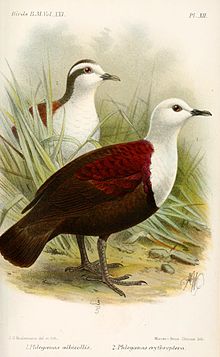Polynesian ground dove
| Polynesian ground dove | |
|---|---|
 |
|
| Illustration of D. e. albicollis and D. e. erythroptera by John Gerrard Keulemans, 1893 | |
| Scientific classification | |
| Kingdom: | Animalia |
| Phylum: | Chordata |
| Class: | Aves |
| Order: | Columbiformes |
| Family: | Columbidae |
| Genus: | Alopecoenas |
| Species: | A. erythropterus |
| Binomial name | |
|
Alopecoenas erythropterus (Gmelin, 1789) |
|
| Synonyms | |
|
|
The Polynesian ground dove (Alopecoenas erythropterus) is a critically endangered species of bird in the family Columbidae. It is endemic to the Tuamotus in French Polynesia with recent records from the atolls of Matureivavao, Rangiroa, Tenararo, Morane, Vahanga and perhaps Tikehau. It favors tropical forests, especially with Pandanus tectorius, Pisonia grandis and shrubs, but it has also been recorded from dense shrub growing below coconut palms. It is threatened by habitat loss and predation by introduced species such as cats and rats. The total population is estimated to be around 100-120 birds and it has already disappeared from several islands where it formerly occurred.
The Polynesian ground dove was originally described in 1789 as Columba erythroptera by Johann Friedrich Gmelin. The holotype was collected from the island of Moorea in the Society Islands. The Polynesian ground dove forms a superspecies with its closest living relatives, the white-breasted, white-fronted, and white-throated ground doves. This superspecies is closely related to the Tongan, Santa Cruz, and thick-billed ground doves.
...
Wikipedia

